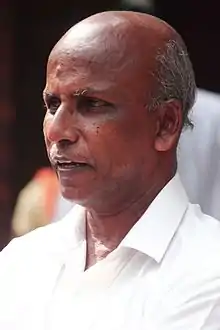M. Geethanandan
M. Geethanandan is an Indian social activist working on political and economic issues faced by tribals and dalits in the state of Kerala, India.[1] He co-founded the Adivasi Gothra Mahasabha along with C.K. Janu and others. He has been involved in organising several protests and struggles of Adivasis (tribes) and Dalits, notably the Muthanga agitation, an incident of police firing on the Adivasis in the Muthanga village of Wayanad district, Kerala.
M. Geethanandan | |
|---|---|
 | |
| Born | 1954 Thayyil, Kannur district, Kerala |
| Nationality | Indian |
| Known for | Muthanga incident (2003) |
Biography
Geethanandan was born in Thayyil, Kannur district, Kerala, in 1954 in a Dalit family. After obtaining Master of Science degree in Marine Sciences, he worked at the accountant-general's office in the state capital Thiruvananthapuram for about 20 years.[2]
Kudilketti struggle
In 2001, C.K. Janu and Geethanandan led a protest of Adivasis from all over Kerala in Thiruvananthapuram. The protesters erected kudil (shacks) in front of the secretariat and demanded land rights. The protest came to be called as the Kudilketti struggle. [3] The Adivasi Gothra Mahasabha was born during this struggle.
Muthanga incident
On February 19, 2003, C.K. Janu and Geethanandan also led the occupation of land at Muthanga.[4] The occupation ended with massive police violence in which a policeman and an Adivasi person were killed.[5] It came to be known as the Muthanga incident and Janu had to undergo imprisonment and face 75 cases filed against her.
The tribal people had gathered under Adivasi Gothra Maha Sabha (AGMS) to protest the Kerala government's delay in allotting them land, which had been granted in October 2001. During the protest, Kerala police fired 18 rounds resulting in two immediate fatalities (one of which was a police officer). In a subsequent statement, the government placed the official death toll at five. A video of the firing was aired on several television news programs[6] and prompted noted author, Arundhati Roy, into writing You have blood on your hands.
On 21 February 2003, AGMS leaders C. K. Janu and Geethanandan were arrested. The two were spotted by locals at a roadside, near Nambikolli, about 4 kilometers from the town of Sulthan Bathery on the Bathery-Ootty road. K. K. Surendran, a lecturer in DIET, was also arrested in connection with the tribal agitation in the sanctuary.[4]
Villuvandi protests
Along with leaders of other Adivasi and Dalit organisations, Geethanandan protested that demanded the reinstatement of the rights of the Malayaraya Adivasi community over the land and temple in Sabarimala.[7] The protests used Villuvandis (carts), borrowing from the protest led by Ayyankali in 1893 demanding the right to use public roads.[8]
Dalit hartal
On 9 April 2018, various Dalit and Adivasi organisations organised a dawn-to-dusk strike against the perceived dilution of the Scheduled Caste and Scheduled Tribe (Prevention of Atrocities) Act, 1989 by the Indian supreme court.[9] Geethanandan co-organized the hartal and was arrested by the State police.
References
- Kerala Development Report By India. Planning Commission 2003. pp. 362. Print.
- Steur, Luisa (2017). Indigenist Mobilisation: Confronting Electoral Communism and Precarious Livelihoods in Post-reforms Kerala. Hyderabad: Orient BlackSwan.
- "Adivasis Are Not Begging For Charity, But Their Constitutional Rights". May 14, 2018.
- Reporter, Our Staff (February 23, 2003). "Janu, Geetanandan arrested" – via www.thehindu.com.
- Nair, R. Madhavan (February 20, 2003). "Two killed as tribals, police clash" – via www.thehindu.com.
- "Two killed as tribals, police clash". The Hindu. 20 February 2003. Retrieved 20 April 2012.
- "ശബരിമല ; മലയരയരുടെ അവകാശങ്ങള് തിരിച്ചുകൊടുക്കണമെന്നാവശ്യപ്പെട്ട് ആദിവാസി ദളിത് സംഘടനകള് പ്രക്ഷോഭത്തിന്". Asianet News Network Pvt Ltd.
- "Dalit activists organise second 'Villuvandi Yatra' in Kerala in wake of Sabarimala protests". SabrangIndia. December 26, 2018.
- "SC/ST Act dilution: Partial shutdown in Kerala, Dalit leader M Geethanandan held". April 9, 2018.
Further reading
- C.K Janu and M. Geethanandan (2003). The return to Muthanga. People's Union for Civil Liberties. Archived from the original on 6 May 2006. Retrieved 28 October 2005.
- Darley Jose Kjosavik, Nadarajah Shanmugaratnam (2015). Political Economy of Development in India. Routledge. ISBN 9781317548492.